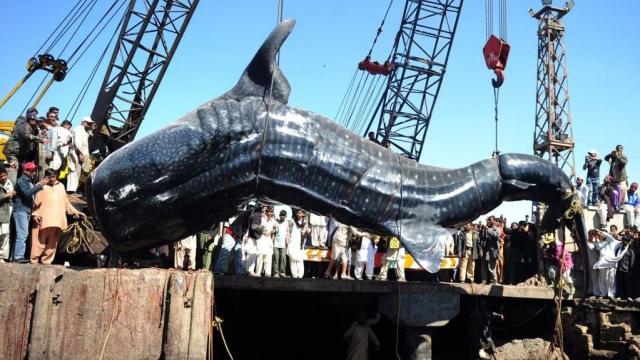The oceans’ gentle giants are being wiped out by human activity, new research shows.
The spotted fish (which are sharks, not whales) are fugly in a cute way and are also surprisingly docile, despite their intimidating size. Whale sharks are the largest fish in the ocean and can grow to 40 feet or more, but they’re no match for even bigger boats. So thanks to the global shipping industry, they’re turning into the ocean’s roadkill.
A new report in the Proceedings of the National Academy of Sciences found that the international shipping industry is hurting the already endangered species. For decades, researchers were unsure as to why populations of whale sharks were seemingly reducing around the world. Their numbers have decreased 50% in the last 75 years.
To unravel this mystery, scientists from 50 research institutions around the world and universities collaborated to track ships and sharks throughout the oceans, to understand the possibility of collisions between the two. They looked at data from tagged sharks from 2005 to 2019, analysing the movements of 300 whale sharks along shipping routes in the Indian, Pacific, and Atlantic Oceans. Sadly, the sharks they studied were constantly in the path of shipping vessels — in fact, about 90% of their movement occurred near shipping activity. They found that tag transmissions were more likely to end in areas with higher shipping vessel traffic.
“Some of the tags recording depth as well as location showed whale sharks moving into shipping lanes and then sinking slowly to the seafloor hundreds of meters below, which is the ’smoking gun’ of a lethal ship strike,” David Sims, senior research fellow at the Marine Biomedical Association and University of Southampton, said in a press release. “It is sad to think that many deaths of these incredible animals have occurred globally due to ships without us even knowing to take preventative measures.”
These huge sharks like to hang out near surface waters, which increases their chances of being hit by the bottom or side of large vessels. They are also pretty slow swimmers, they’re slow to react, and they migrate often, which increases their risk of coming in contact with ships. In the report, the researchers note that many of the shark deaths go unreported because the sharks sink to the bottom of the ocean when they die.
Losing whale sharks has ripple effects beyond just the loss of these majestic creatures. These huge fish mainly feed on microscopic marine animals called zooplankton. They regulate the plankton levels in their surroundings, which helps stop harmful algae blooms.
There are regulations in place to protect whale sharks from commercial fishing, but there are no international regulations on shipping vessels related to shark migration, according to the team. They argue that governments should make efforts to save whale sharks from shipping vessel movements by rerouting some shipping traffic. They emphasise intervening “before it is too late” so that these sharks can also stand a chance against other impending threats, including shifting ocean conditions from climate change.
Editor’s Note: Release dates within this article are based in the U.S., but will be updated with local Australian dates as soon as we know more.
